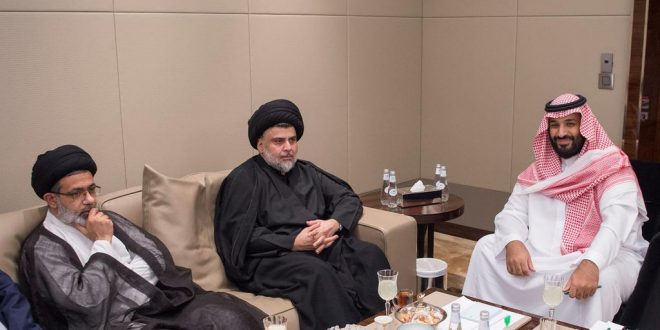 ANALYSIS: Is this the beginning of a new era for Iraq without Iran?
ANALYSIS: Is this the beginning of a new era for Iraq without Iran?
By Heshmat Alavi
The military phase of the fight against ISIS is winding down after the liberation of Mosul, and the battle for the nearby town of Tal Afar
is predicted to end soon. This has provided an opportunity for Iraq to
begin distancing itself from the influence gained by Iran following the
disastrous 2003 war, and returning to its true Arabic heritage.
Iraq was known as a melting pot where Arabs,
Kurds and Turkmens lived alongside and in mixed societies for centuries.
Prior to Iran gaining its disastrous sway across Mesopotamia, this was a
land where the majority of Shiites lived and prospered with their
Sunni, Christian, Yazidi and all other religious minority brothers.
Has not the time arrived for Iraq to regain
its true position as part of the Arab world, and rid its soil of the
meddling of Iran’s clerics?
Long-awaited developments
Iraqi officials have embarked on a new
campaign of visiting Saudi Arabia and other Arab Sunni states, signaling
long-welcomed changes. The influential Sadrist leader Muqtada was seen in the final days of July meeting with Saudi Crown Prince Mohamed bin Salman.
Only days later Sadr paid
a visit to the United Arab Emirates, another critic of Iran’s policies,
where he was welcomed as an Iraqi leader by a slate of leading
politicians and clerics.
Sadr’s
visit rendered a variety of measures by Riyadh, including launching a
Saudi Consulate in Sadr’s hometown of Najaf, one of the two holiest
Shiite cities in Iraq. Grand Ayatollah Ali al-Sistani, known as Iraq’s
most senior Shiite cleric, his distance from Tehran’s viewpoints and
calling for Iraq to practice openness in establishing relations, did not
block such a proposition.
Iran, however, resorted to strong remarks against Sadr for his visits to Saudi Arabia and the UAE. The visit was even described by a local wire as an act of betrayal to the Houthis in Yemen.
Iran’s support for the Shiite proxy militias,
through arms, logistics and finances, parallel to advisors dispatched by
the Revolutionary Guards (IRGC) and Lebanese Hezbollah, have resulted
in the humanitarian catastrophe Yemen finds itself today.
Sadr is also planning a visit to Egypt,
adding to the list of senior Iraqi officials, including Prime Minister
Haider al-Abadi and the ministers of foreign affairs, interior, oil and
transportation who are set to visit Saudi Arabia. Despite investing in
Iraq for the past 14 years, Iran has been deprived of visits of such
high stature.
No future
Iran’s proxies, while taking the credit for
much of the fight against ISIS on the ground, have been accused of law
violations and refusing to obey the state of Iraq. Iraqi authorities
affiliated to Iran have a very poor report card of being involved in
corruption and sacrificing Iraqi national interest in Tehran’s favor.
This became a major issue during the second
term of former Iraqi prime minister Nouri al-Maliki, who some have even
described as Iran’s “puppet.” Maliki is known to have close relations
with Tehran and Iranian Supreme Leader Ali Khamenei himself.
To make matters even worse, the recent
departure of Majid al-Nasrawi, governor of the oil-rich city of Basra
located at the southern tip of Iraq, has recently left for Iran. His
departure followed being accused of numerous corruption offences by a
government transparency committee. Choosing Iran as a destination has
left further impression of him fleeing to a safe haven, and Tehran
having a hand in Iraqi corruption.
Rebuilding cities
As Sadr and
other Iraqi officials continue their meetings with senior Arab
officials of the region, there are also major talks under way between Baghdad and Riyadh to establish a new alliance that would provide Saudi Arabia a leading role in rebuilding war-torn cities across Iraq.
On August 14th the Cabinet of Saudi Arabia
announced a coordination committee to spearhead a variety of health care
and humanitarian projects, including building hospitals in Baghdad and
Basra, and providing fellowships to Iraqi students in Saudi
universities. Opening border crossings and establishing free trade areas
between the two countries is also on the agenda.
Riyadh should lead the Arab world in tipping
the balance of power against Tehran’s interests in Iraq. The truth is
Iran has not carried out any major economic project in Iraq from 2003
onward, due to the fact that the mullahs do not seek the prosperity of
their western neighbor.
Saudi Arabia and the Arab world should provide
the support Iraq needs after suffering from Iran’s menacing influence
that has brought nothing but death and destruction. Evicting Iran from
Iraq must come parallel to efforts of ending its presence in Lebanon, Syria and Yemen.
The main obstacle before the Arab world in
establishing a coalition against Iran’s clerics is this regime’s
meddling and the IRGC presence across the region. With Iran evicted from
Iraq, the void should be filled by economic support by the Arab world
for Iraq.
And with the US Congress adopting a bill
against the IRGC, Riyadh must take the lead to have all IRGC members,
proxies and Iran-related elements expelled from the region. Only such a
policy will allow the Middle East to one day experience tranquility and
peaceful coexistence